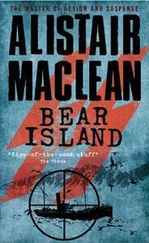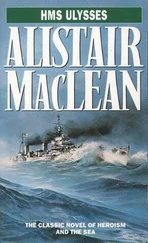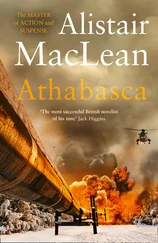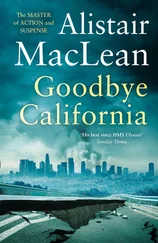Kan Dahn slipped into a double bowline, secured a bight round his waist, belayed the rope round three spikes — probably a sensible precaution for a man of his massive weight — and lowered himself down to the window ledge. He clenched a massive fist round each of the central bars and began to pull them apart. The contest was brief and unequal. The bars bent as if made from some inferior putty, but Kan Dahn wasn’t content with just making a gap: he leaned some more on the bars and both came free from their anchorages. He handed them up to the roof.
Bruno joined Kan Dahn by means of a separate rope. Arrived opposite the window, he used his flash and peered through the glass. It appeared to be a perfectly innocuous office, bleakly furnished with metal cabinets, metal tables and padded metal seats. It certainly offered no hint of danger. While Kan Dahn held the torch Bruno produced a roll of brown paper, unrolled it and pressed one side against a pane of glass. That side was clearly adhesive. He waited a few seconds then struck the centre of the glass quite firmly with the heel of his fist. The glass came away and fell into the room, making practically no noise at all. Bruno took the torch from Kan Dahn and, holding both torch and wire-cutters in the same hand, thrust his head and one of his arms through the hole he had made. He located the unconcealed alarm wires at once, severed them, reached up and opened the window catch and pushed the lower window upwards. Ten seconds and both he and Kan Dahn were inside the room: another ten and Manuelo had joined them. He was carrying Kan Dahn’s crowbar with him. The office door was unlocked, the corridor beyond deserted. The three men made their way along until they came to an open door on the left. Bruno signalled to Manuelo to move forward. He did so and, holding a knife by the blade, cautiously showed an inch of the hilt round the edge of the jamb. Almost at once came the sound of discreet tapping on the glass of the hatch cover above, enough to alert the card-playing soldier but not enough to disturb the three sleeping men. The guard at the table looked up questioningly, and then it was over. The hilt of Manuelo’s knife caught him over the ear and Kan Dahn caught him before he even had time to strike the ground. Bruno picked up one of several guns stacked in a ramp and covered the three others with it. The last thing he wanted or intended to do was to use it, but the three men were not to know that and a man waking from his sleep is not going to argue with a Schmeisser machine-pistol. But they kept on sleeping soundly even when Kan Dahn unbolted the trap-door to allow Roebuck — and his canvas bag — down into the guardroom. Bruno took out his gas pen and advanced upon the three sleeping guards: Roebuck, armed with a suitable amount of rope, followed him. They left the four guards there, securely bound and taped, three of them even more deeply asleep than they had been a few minutes previously. They bolted the trap-door, a probably unnecessary precaution, locked the guard-room door behind them and removed the key. Bruno said: “So far, so good.” He hefted the Schmeisser he had borrowed from the guard-room. “Let’s call on Van Diemen.”
Kan Dahn paused in the passageway and looked puzzled. “Van Diemen? Why do we have to attend to him first — or at all? You know where his offices and laboratories are. Why don’t we go straight in there now, find out the papers you want — you’re quite sure you’ll recognize those —” “I’ll recognize them.”
“Then fold our tents and steal away into the night. Like the Arabs, you know. A classy job, smooth, slick and noiseless. That’s what I like.”
Bruno looked his disbelief. “What you would like is to crack every skull in the Lubylan. I can give you four reasons for not doing it your way and then no arguing — the change of the guard may be due at any moment. Time is not on our side.” “The change of guard is all nicely asleep in the guard room.” “That may not be the change of guard. They may have to report to some kind of HQ at change-over. There may be an officer who carries out a routine inspection. I don’t know. Reason one: what we want may be in his private quarters. Reason two: we may be able to persuade him to tell us where the papers are. Reason three: if his filing cabinets are locked — and it would be astonishing if they aren’t — we may make quite a noise in opening them up and his quarters are right next door. But reason four is most important. You should have guessed.”
From their expressions it was apparent that no one had guessed.
“I’m taking him back to the States with me.”
“Taking him back —” Roebuck looked his incredulity.
“You’ve been through too much. It’s your mind.” “Is it? What the hell’s the point in taking the papers back home and leaving him here? He’s the only man who knows those damned formulas or whatever they are — and all he’d do is just sit down and write them out again.” Roebuck said in slow comprehension: “You know, that had never occurred to me.”
“Hadn’t occurred to a lot of other people either, it would seem. Very odd, isn’t it? Anyway, I’m sure that Uncle Sam can always find him a nice congenial job.”
“Such as supervising the development of this damnable antimatter.”
“From what I’ve heard of Van Diemen, he’d die first. He’s a renegade, you know that. It must have taken some awfully compelling political and ideological reasons for him to defect from West Germany to here. He’d never co-operate.” “But you can’t do this to a man,” Kan Dahn said. “Kidnapping is a crime in any country.”
“True. But better than death, I would have thought. What do you want me to do? Have him swear on the Bible — or any handy Marxist treatise that we can lay hands on — that he’ll never again reproduce any of those formulas? You know damned well that he’d never consent to that. Or just leave him in peace to write his memoirs — all about how to construct this hellish weapon?”
The silence was very loud.
“You haven’t left me much choice, have you? So what would you have me do? Execute him in the sacred name of patriotism?”
There was no immediate answer to this because he’d left them without the option of an answer. Then Kan Dahn said: “You have to take him back home.”
Van Diemen’s door was locked. Kan Dahn leaned on it and it was no longer locked. It crashed back against its hinges and Bruno was the first in, Schmeisser levelled — it had occurred to him, not, fortunately, too belatedly, that, without some recognizably offensive weapon, they were at a distinct disadvantage — a wandering guard, seeing them apparently unarmed, would be sorely tempted to cut loose with whatever weapon he might possess.
The startled man, propped on one elbow and rubbing sleep from his eyes, had a lean aristocratic face, grey hair, grey moustache and grey beard: he looked the exact antithesis of the mad scientist of popular conception. His unbelieving eyes switched from the intruders to a bell-push on his bedside table. “Touch that and you’re dead.” Bruno’s voice carried utter conviction. Van Diemen was convinced. Roebuck advanced to the bell-push and sliced the flexible lead with the wire-cutters. “Who are you? What do you want?” Van Diemen’s voice was steady, seemingly without fear: he had about him the look of a man who has suffered too much to be afraid of anything any more.
“We want you. We want the plans of your anti-matter invention.”
“I see. You can have me any time. Alive or dead. To get the plans you’ll have to kill me first. They’re not here anyway.” “You said the last two sentences the wrong way round. Tape his mouth and tie his hands behind his back. Then we look. For papers, keys, perhaps even one key.”
Читать дальше
Конец ознакомительного отрывка
Купить книгу











